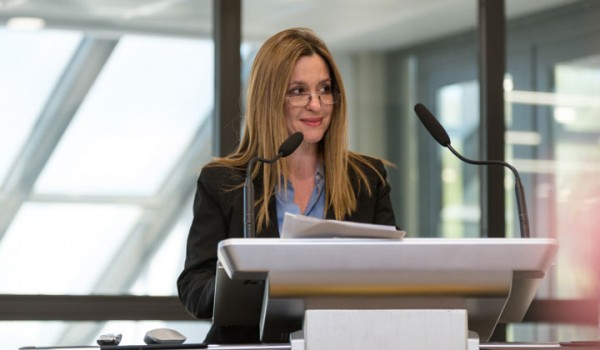
The economic crisis of 2008 changed many, many things in Greece. As deficiencies of the state became more and more evident, private entities intervened to keep the Greek social fabric from breaking apart. An individual with an optimistic vision of the future, Angeliki Kosmopoulou (P’84), stepped in to assist. She is Executive Director of the A.C. Laskaridis Charitable Foundation and Board Member of The People’s Trust, a newly founded non-for-profit organization aiming to alleviate pressure from Greek society by acting as a positive force and driver of job opportunities in Greece. We interviewed her to find out more about her, the A.C. Laskaridis Foundation and her commitment to a better future.
TB: Τhe A.C. Laskaridis Charitable Foundation is a relatively newly established organization, can you tell us a few things about it?
AK: The A.C. Laskaridis Charitable Foundation was established during the height of the Greek crisis, partially in response to it. Active in charitable giving over many years, the Laskaridis family decided to organize its giving strategically, in order to multiply its impact and create synergies. The Foundation works across three key areas: the environment, people, and public interest projects. As a hybrid foundation, we fund programs run by non-profit organizations, but also design and implement our own. We believe that contemporary charitable organizations play a role that goes far beyond funding: they lead change. Thus, we begin with research, we analyze needs and work in areas where we can best help the Greek people and the environment. Collaboration is key to us. As an independent family foundation, we aim to act as a catalyst for greater change than we could achieve alone.
TB: What is the People’s Trust? What does it aim for and what does it mean for Greece?
AK: The People’s Trust is a not-for-profit organization that supports both new and existing small businesses in Greece. Its mission is to relieve unemployment through entrepreneurship and job creation. The organization offers grantees a combination of financial support, business services, training and networking, in order to help them grow and succeed. By investing in people, it aims to reinforce long-term improvement in individuals’ lives and spur positive economic and social change. The People’s Trust has supported over 105 businesses and has helped create over 220 jobs to date. As our country has a very high unemployment rate, the highest in the EU when it comes to youth (49.6 %), finding practical ways to support people who wish to “take life in their own hands” is a priority.
TB: Amidst the Greek crisis, how important is it for someone to be involved with charities, philanthropy and environmental conservation?
AK: Philanthropy has a very long history in Greece and is still one of the driving forces of positive change. Nowadays, foundations and private donors are redefining their role, moving away from signing checks into a more rewarding role of intervening in areas where support and improvement are needed. Foundations can address issues that the public sector cannot handle, respond to needs in a fast and efficient manner, draw on a variety of resources, as well as act independently to support worthy causes. This makes them even more essential at times of crisis, where needs on the national, local and individual level are increased. We believe that everyone should have the right to lead a rewarding and dignified life and, through our work, we make it happen.
TB: What are the joys of giving back? What drives you to give back to society and nature?
AK: There are many rewards stemming from philanthropy, on several levels. There are cases where the results of our work become immediately apparent – and they can take many forms, such as financial support, job creation, fast immediate relief to victims of a crisis and more. In many other cases, the desired change is hard and can be slow to happen. This is when we have to stay involved for the long-term and help however we can. As contemporary philanthropy has shifted away from the occasional donation led by a funder’s own preferences, its success is assessed by a set of metrics that no longer have to do with amounts of money alone. This is a blessing and a challenge at the same time. Overall, when working in this field, you have to embrace the role of a “changemaker” and become part of the desired solution, using as many institutional and personal resources as you can. And, believe me, there is nothing more rewarding than being able to help and drive positive change.
TB: How did the education you received at Pierce help you in your life? What would you tell Pierce alumni who wish to impact the world?
AK: My years at Pierce have been among the most formative of my life. They have forged my personality, in and out of school. “Non ministrari sed ministrare”, (To serve, not to be served), the school’s own motto, sets the scene: it prepares you to be part of the world, to serve, to act, to take initiative. Certainly, this goes far beyond the motto. The school’s own culture empowers students and nurtures the sense that anything is possible if you are willing to do the work. This is exactly what I would advise my fellow alumni: to dream, challenge themselves, challenge others’ perceptions and never take “no, I can’t” for an answer.
Wanting to further engage and inspire the Greek youth, Dr. Angeliki Kosmopoulou also participated in the Deree Business Week 2018 in March 2018. She and Paul Kidner, General Manager of TPT, spoke about the vision of the TPT and encouraged students to come forth with their business ideas. This allows the TPT to mentor and aid them financially, so they can help launch their businesses.
We would like to thank Ms. Kosmopoulou for taking the time to participate in Deree Business Week 2018, inspiring young entrepreneurs. We wish her all the best with her future endeavors.
